The Importance Of Vitamin K And Which Foods To Eat
Broccoli

Broccoli is famous for conferring numerous health benefits while tasting great. It's low in calories, but high in fiber, vitamins, and minerals. This plant comes from a vegetable family called cruciferous vegetables and is closely related to cabbage and cauliflower. Like all cruciferous vegetables, the plant contains sulforaphane. This compound contains sulfur and may have anti-cancer properties, according to researchers. One cup of steamed or cooked broccoli has the same amount of vitamin C as an orange. You'll also get vitamin B1, B2, and B6. As for minerals, it has a great deal of zinc, potassium, magnesium, and iron. Like many vegetables, it's rich in dietary fiber while also being low in calories and sugars. Just a bit of this vegetable each day can provide you with your daily intake of vitamin K, helping promote good clotting and bone health.
Continue reading to reveal more excellent sources of vitamin K.
Soybeans

Soybeans provide a popular substitute for individuals who don't eat dairy products or meat. They also have many health benefits that make them much healthier options than meat and dairy products. The beans have the potential to lower blood pressure and improve the blood vessels by creating greater elasticity within the artery walls. Due to the large amount of vitamin K, they help reduce the risk of osteoporosis. Some research indicates they may protect against a few different cancers, including skin, prostate, colon, and breast cancer. They may also be used due to their anti-inflammatory effects and help with managing endometriosis. Individuals tend to experience the health benefits when they eat from thirty to fifty milligrams of isoflavones per day, which is about half a cup of soybeans. The plant might also protect individuals against coronary heart disease thanks to its ability to lower cholesterol. It's also helpful in managing the symptoms of menopause.
Get to know the next fantastic source of vitamin K.
